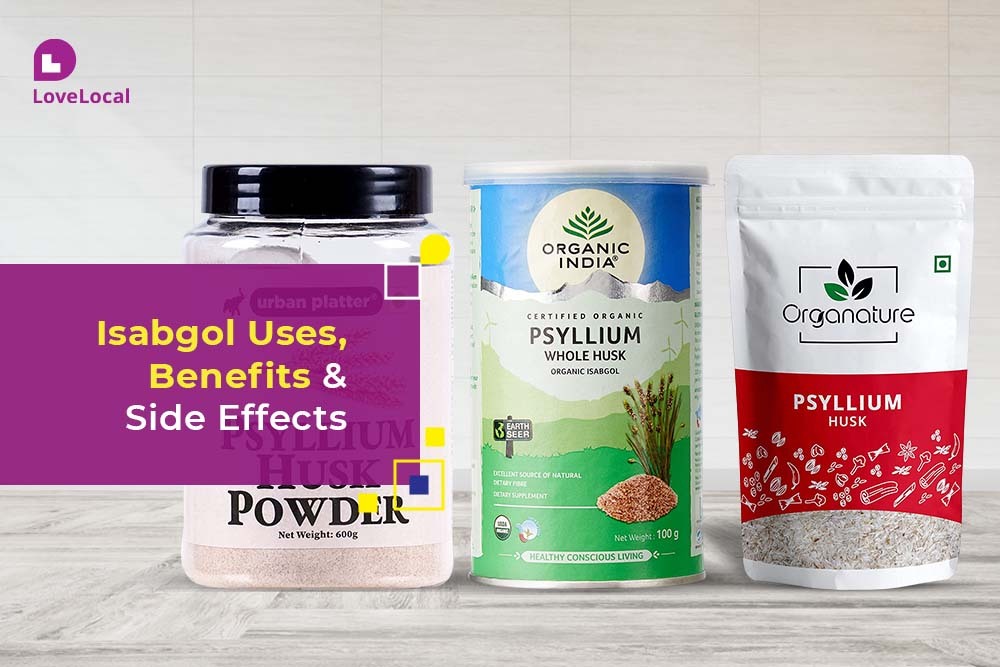Psyllium husk, also known as isabgol husk, is an organic polymer. It is made up of the epithelia and adjacent collapsed layers of the plant Plantago ovata Forsk seeds (P. ispaghula Roxb.). It contains a lot of mucilage and fiber. Mucilage is a colorless gelling agent that can absorb up to 40 times its weight in water and expand in volume. Dietary fiber derived from Psyllium husk can be used in packaged foods, as a food ingredient, and in pharmaceutical supplements. Isabgol is a perennial herb native to Western Asia. Indian Muslims first introduced its medicinal benefits by collecting seeds from various wild species. India is currently the world’s largest manufacturer and exporter of isabgol husk.
Therapeutic Uses of Isabgol
This naturally produced swellable biomaterial herb has piqued the interest of researchers over the last decade. Because of its cholesterol-lowering properties, it has traditionally been used as drug and is now being used in the pharmaceutical industry. It also lowers the risk of heart disease. It is a bulk-forming laxative that is non-irritant, purgative, and a cervical dilator. It is primarily used in the following situations:
- Constipation on a regular basis.
- Conditions in which easy defecation with soft stools is preferable, such as hemorrhoids, anal fissures, and difficult efflux after anal or rectal surgery.
- Patients with irritable bowel syndrome and hypercholesterolemia, for example, must consume a high fiber diet on a daily basis.
Benefits of Isabgol:
Isabgol has several benefits for living a healthy life. If taken at the recommended dose, it is both safe and beneficial for some conditions.
1. Benefits of Isabgol for Constipation
Isabgol helps stools pass more easily because it contains unfermented gel, which acts as an emulsifier and lubricant. According to studies and clinical trials, it significantly increased stools moisture and both dry and wet stool weight in patients with acute gastroenteritis. Isabgol is used to treat constipation because of these properties.
2. Benefits of Isabgol for Bowel Diseases
Because of its anti-constipation activity, isabgol supplementation may aid in the management of irritable bowel syndrome, inflammatory bowel disease, and ulcerative colitis. Anaerobic fermentation of isabgol fiber in the digestive tract produces a large amount of metabolites with antioxidant and anti-inflammatory properties. It is an important benefit of isabgol husk powder.
3. Benefits for Diarrhea
According to studies, isabgol powder also slows down colon transit and gastrointestinal emptying time, which is beneficial to people who suffer from diarrhea or fecal incontinence from liquid stools.
4. Benefits in Managing Hemorrhoids
Isabgol supplementation in the diet can help with hemorrhoids. Since isabgol helps in dealing with both constipation and irritable bowels, it would also help in managing hemorrhoids. In a comparative study, people given a placebo of B vitamins had no significant difference, whereas those given isabgol had less bleeding.
5. Benefits of Isabgol in Weight Loss
Isabgol’s high fiber content aids in weight management. Isabgol powder essentially slows the process of stomach emptying. According to one study, it makes you feel fuller and lessens your appetite, and it makes you feel less hungry between meals. It also discourages frequent snacking. Isabgol also aids in fat management by lowering bad cholesterol and managing the body’s overall calorie intake.
6. Benefits of Isabgol in Pregnancy
Ispaghula husk is beneficial to pregnant and breastfeeding women. It alleviates gastric issues that occur during pregnancy, such as indigestion and constipation. However, because Isabgol is a laxative, it should not be combined with a high-fiber diet because it can cause loose motions. See a physician before beginning Isabgol during pregnancy or while breastfeeding.
7. Benefits of Isabgol for Reducing Cholesterol
Isabgol fibers (both soluble and insoluble) have been shown to lower total low-density lipoprotein and cholesterol level. As a result, it lowers the chance of developing heart disease.
8. Benefits in Managing Colorectal Cancer
It inhibits the antineoplastic activity of butyric acid. As a result, isabgol is thought to be beneficial in the prevention of colorectal cancer.
How to Use Isabgol?
- According to studies, a moderate regular intake of isabgol husk is well tolerated by the body.
- Isabgol husk is widely consumed as a food ingredient in packaged foods as well as in pharmaceutical supplements.
Consult your Ayurvedic physician for dosage recommendations based on your health condition.
Side Effects of Isabgol:
The following are the side effects of isabgol consumption:
The studies reported a few minor unpleasant reactions. There were only minor or insignificant changes in behavior observed.
It expands up later and may clog the throat or esophagus if consumed without enough fluid.
If we fail to maintain a suggested amount of fluid intake in more complicated matters, it may cause intestinal obstruction.
A high-fiber diet may boost insulin sensitivity.
Precautions to Take With Isabgol
Remember the following points:
- Isabgol must be taken with plenty of water or another fluid.
- If you have difficulty swallowing or have any throat problems, you should not consume isabgol.
- If you feel chest pain, breathing problems, difficulty gulping, congestion, or vomiting after consuming isabgol, seek immediate medical attention.
- To reduce the possibility of interactions, prescribed drugs should be taken individually from isabgol.
- Long-term consumption of isabgol husk may reduce absorption of vitamin B12, zinc, iron, magnesium, and copper. It may also have an effect on calcium absorption.
- It has the possibility of lowering dietary carbohydrate absorption.
- It is recommended that drugs be administered separately (preferably one hour before) from isabgol husk to avoid potential interaction.
Interface with Other Drugs
- Some drugs may have lower absorption when combined with isabgol husk or isabgol-containing ingredients because they slow down gastric emptying time.
- Drug levels used to reduce the likelihood of heart disease may also be impacted. As a result, it should only be used under medical supervision.
- When insulin-dependent diabetes patients ingest isabgol husk with meals, insulin doses must be reduced.
- When taking isabgol husk concurrently, medical guidance is needed to adjust the dose of thyroid hormones.
- Isabgol should be used under medical supervision in conjunction with peristaltic movement inhibitors (muscle contractions that move food through the digestive tract).
Conclusion
Isabgol has been around for centuries. It’s also one of the finest fibers for gastrointestinal health and weight loss, among other benefits. Isabgol husk variants are available in the market from brands such as Dabur, Patanjali, Organic India, and others. So give Isabgol a try today with LoveLocal and reap the benefits.



